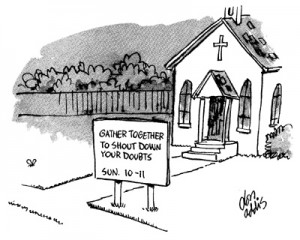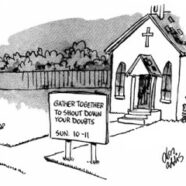Honest evangelism
 I was revising my evangelism teaching notes and came across an old article about ‘deconversion’.
I was revising my evangelism teaching notes and came across an old article about ‘deconversion’.
This article has always struck a cord with me and I thought it was about time I shared it with you. It’s long, but worth it. I can no longer get in contact with the orginal author to get personal permission. But I have noticed it is now scattered throughout the wonderful land of public domain on the net, so I hope it is ok (if it’s yours, please email me).
The late fall afternoon is peaceful as I cozy up on the sofa for a few hours of cable television movies. Flipping through the channels, I happen upon a prerecorded televangelist rally. I pause to observe. The small man on the stage shouts into his cordless microphone about the power of God and the salvation of Jesus, stomping up and down the length of the stage, visibly energized by the clamorous feedback of his audience. Although the program is nearing its end I know he has been performing in this manner for about an hour. He concludes his sermon with an emotional prayer backed by a solemn minor-key melody on electric piano. I watch then as hundreds of people stream from the arena seats to the stage, seeking salvation in the small man’s invitation to become “born again.” There are close-ups of teary-eyed individuals with upraised arms, singing and praying, overcome by joy to have finally found salvation.
The scene transports me back in time to my mid-teens when I, too, once responded to an altar call in a very large arena. I know what the people on the television are experiencing. I know also that many of them will one day abandon their “salvation.”
Fundamentalist Christianity was for me an 11-year ordeal of confusion, self-censorship and self-abasement. After the joy of my initial religious experience wore off, I moved into the modus operandi of Christian fundamentalists everywhere: I shut down emotionally and instead relied on the Bible to dictate my feelings. In Christian fundamentalist circles this is known as “living by faith.”
In my mid-20s I experienced a severe crisis which led me to question the wisdom of living in this manner. Over a period of about a year I allowed myself to think the doubtful thoughts which I had been filing away in the back of my mind for so long. I felt as if I was issuing a direct challenge to God himself, and lived in great fear of divine retribution. My doubts led me to discover that it was indeed possible to make sense of life, to make decisions for myself, to set and attain goals, and to know my own heart. My spiritual path forked. Do I remain true to honesty, or true to the faith? I chose honesty. Thus was I deconverted.
For several years I believed my experience to be unique. In time I met another person who had defected from the ranks of Fundamentalist Christianity; then another, and others still. I am now convinced that the number of Americans who have had a “deconversion” experience of some type is much greater than one would suspect.
Deconversion is currently an under-studied phenomenon which could provide an important perspective from which to understand religion in America. The specific psychological, sociological, cultural, and political implications of large numbers of religious deconverts are beyond the scope of this paper. Nevertheless, it is important to understand that deconversion births as radical a psychological shift as the original conversion experience. It is quite enough to impact American culture and religion, just as conversion experiences produce “born-again” Christians who impact American culture in clearly manifest ways.
To understand these questions I turn to Leaving the Fold: Testimonies of Former Fundamentalists, edited by Edward T. Babinski. This volume is a collection of 33 deconversion autobiographies from people once active and highly visible within the ranks of Fundamentalist Christianity. These essays give articulate voice to the deconversion process. They are at once diverse and congruous. Leaving the Fold is not intended to provide scientific statistical data; rather, it is an informal survey which provides much useful anecdotal material.
Surprisingly, the testimonies present only two key factors in their authors’ deconversions. The first is related to external circumstances, including the behavior of other church members, leadership, or the denomination. The second is wholly internal: church doctrine simply becomes untenable.
The most common and compelling motivation for leaving fundamentalist Christianity cited by Leaving the Fold’s contributors is, by far, a loss of personal faith. For the majority, the deconversion process begins with a single question, or group of questions, for which he can find no answer. This pattern emerges repeatedly. It is as if their fundamentalist faith is a large puzzle. Slowly at first, random pieces begin to fall away, creating holes in the overall image. These holes weaken the puzzle structure, allowing more pieces to fall away. Eventually all the pieces fall away leaving the deconvert free of the fundamentalist worldview. While this process is painful in many ways, all the writers consider it to be, ultimately, a great liberation. It is surprising how many of Leaving the Fold’s writers consider their deconversion experience to be a “rebirth,” or liken it to being “born again.”
Another interesting aspect of the deconversion experience is that it is largely involuntary. Not one of Leaving the Fold’s contributors relates a process in which he consciously decides to leave the faith with deconversion as a goal. The testimonies are of those who set out to find their answers in an effort to maintain their faith. Only grudgingly did they come to accept that the answers for their questions were to be found outside church doctrine. In various ways each describes how he was forced by intellectual honesty to face his discoveries.
It may seem surprising at first to think of deconversion as an involuntary act. However, I would point out that the initial experience of being “saved” is very often itself involuntary. Converts are generally not provided with all the facts necessary to make an informed decision. Instead, revival meetings and proselytization efforts are engineered to create a specific vulnerable emotional state within the target. The convert is then manipulated into accepting whatever religious message the evangelist has to peddle. Individuals converted by such deceptive methods have not voluntarily chosen to convert; they have been coerced. It is a difficult thing to accept that one has been duped. No one chooses discover that he has been lied to.
…ENDS
I could spend hours talking about this one person’s experience! But truthfully just talking about it would not be doing him any justice. We need to feel the weight of some of his conclusions. I would like to offer you some of reflections and hopefully hear what you think.
The author states the ‘deconversion’ experience often starts with just one question, and then a group of questions. I ask you: who hasn’t experienced that before? One experience can lead to a change in paradigm which then leads to a complete change in how we go through the selective sensory process.
For example, as a result of reading this article on ‘decoversion’ experience and trying to play an active role in talking with these ‘deonversion’ guys online, I have changed the way I go about evangelism… I am no longer interested in coercing an emotional response. While that may not sound like a big change at first… but just stop for a moment and think about it, how much of your evangelism efforts were or are focussed on getting an ’emotional’ response from the other parties?
I’m not interested in getting them to pray the sinners’ prayer, the sinners’ prayer is not some magical words, the effectivness in the ‘sinners’ prayer’ rests in the God to whom the prayer is offered… I am more interested in being the type of person who gives someone the chance to talk to God and to ask the questions which have plagued them.
I want the person to be able to be free and honest with God.
Strangely enough I have seen a common thread amongst the ‘deconversion’ crowd and we can all see it in the evangelism process. The common question or common questioning is, ‘What about those people?’ ‘What about the people who never have the chance?’ ‘What about those people who have been completely neglected?’ ‘What about those people who have been sincerely and wonderfully compassionate… but sincerely wrong?’ This in my experience is just the surface of the questioning, but if you scratch a bit deeper it leads to something even more profound.
Basically it boils down to… ‘I could not give myself to a God who doesn’t care about everyone.’ ‘I could not worship a God who is indifferent to the majority of this world’s population!’
I’ve often missed that deeper underlying value to the question. These people are not asking for a right and wrong, a true and false, a theological explantation… they simply want to know… does God love! Is God love?
How do Christians react to that question? How have I reacted? Perhaps indifferently? Perhaps defensively? ‘I am sorry Jesus is the only way’.
What ends up being communicated most of the time is that Christians are the least caring people on the face of the planet. Because somehow we turn it into a which religion is right?
These people do not care ‘which religion is right’. All they want to know is: can God really be there with those who are hurting? They want to know if He is close.
I will stop it there and see if anyone is interested in taking this discussion further. I do have more to say on the subject but won’t other unless you’re interested.







